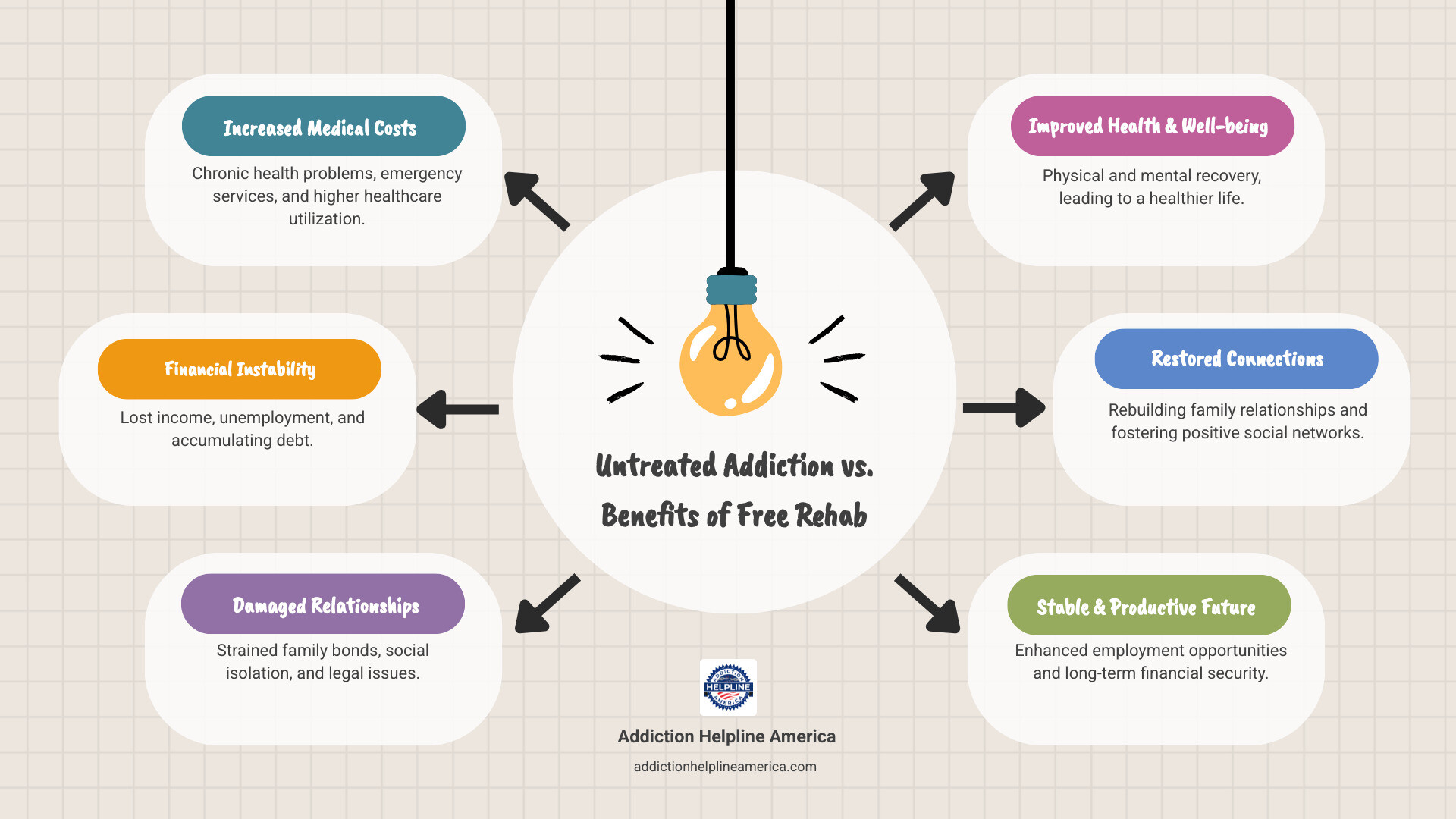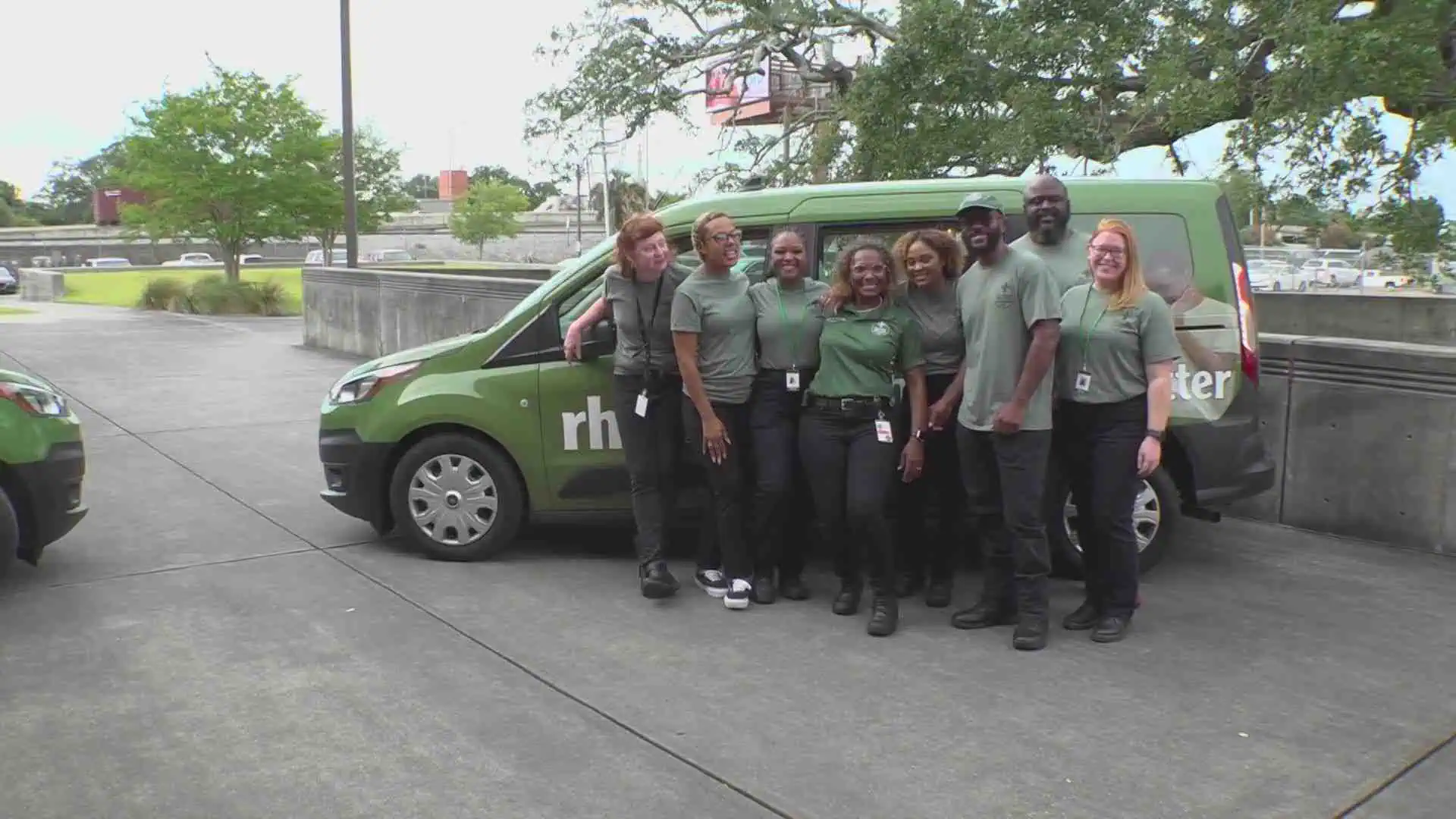
Breaking Through the Financial Barriers to Alcohol Recovery
Free alcohol rehab is available through multiple channels, and cost should never prevent you from getting help. Here are the main ways to access treatment at no cost:
- State-funded programs through public mental health and substance abuse centers
- Medicaid coverage under the Affordable Care Act (essential health benefit)
- Faith-based organizations offering residential and outpatient support
- Peer-led support groups like Alcoholics Anonymous (AA)
- Community health clinics with grant-funded programs
- Scholarships and sliding-scale fees at private treatment centers
- University research programs providing free treatment in exchange for participation
The cost of addiction treatment often feels like an impossible barrier. With residential rehab programs sometimes costing thousands of dollars per month, it’s no surprise that only 10% of people with substance use disorders receive treatment each year.
But here’s the truth: millions of federal and state tax dollars are allocated specifically to subsidize rehab treatment for people who cannot afford it. Free and low-cost options exist in every state. You don’t need insurance, savings, or even income to access help.
The challenge isn’t the availability of free treatment—it’s knowing where to look. State-funded programs, community organizations, and Medicaid coverage are often underused because people don’t realize they exist or that they qualify.
This guide cuts through the confusion. We’ll show you seven practical ways to find free alcohol rehab near you, including how to verify your eligibility and what services you can expect.
At Addiction Helpline America, we connect individuals with free alcohol rehab resources nationwide. Our mission is to ensure everyone can find effective treatment, regardless of their ability to pay.
The path to recovery doesn’t require a large bank account—it requires taking the first step. Let’s explore how to find the help you need.
Free alcohol rehab terms made easy:
How to Find Government-Funded and Community Free Alcohol Rehab
Government programs and community organizations form the backbone of accessible addiction treatment in America. They are lifelines created to ensure recovery is available to everyone, funded by tax dollars for people who can’t afford private treatment. The challenge? They don’t advertise like private facilities, so you have to know where to look.
1. Tap Into State and Local Programs
Every state operates public mental health and substance abuse centers that provide free alcohol rehab to qualifying residents. These programs run on government funds and offer comprehensive care, from inpatient to outpatient support, often without requiring insurance.
Start with your state agency. The Substance Abuse and Mental Health Services Administration (SAMHSA) has a directory of state agencies and a treatment facility locator to find local programs. You can also use Addiction Helpline America’s treatment locator to explore options.
What you’ll need to qualify. State-funded programs require documentation to verify eligibility. Be prepared to show proof of residency, income verification to demonstrate financial need, and your insurance status. Some may ask for your substance use history, but many accept self-referrals. While these facilities may have waitlists and fewer amenities than private centers, the core treatment is solid and evidence-based.
2. Explore Community-Based Organizations
Beyond state programs, local organizations provide free alcohol rehab and support through grants and donations.
Community health clinics are a great resource. Many receive federal grants, allowing them to offer sliding-scale fees based on income, sometimes reducing costs to zero. They provide assessments, outpatient counseling, and referrals to more intensive programs.
Grant-funded programs and local charities like the Salvation Army run faith-based residential programs at no cost. Your local Department of Health and Human Services can also help you determine Medicaid eligibility and connect you with local treatment options.
To find these resources, search for “substance abuse services” plus your state name, or call local resource hotlines. You can also explore our Key Substance Use and Mental Health Indicators to understand the scope of services available nationwide.
Using Insurance and Community Support for No-Cost Treatment
Sometimes the help you need is closer than you think. Your health insurance might already cover treatment, or the support of others who’ve been where you are could be what makes recovery possible. Let’s look at how these connections can open doors to free alcohol rehab.
3. Leverage Your Insurance: Medicaid and the ACA
If you have Medicaid or a health plan through the Affordable Care Act (ACA), you likely have coverage for addiction treatment.
Medicaid pays for drug and alcohol rehabilitation. If you qualify for Medicaid, it can cover detox, inpatient rehab, and outpatient therapy. Specifics vary by state, so call your Medicaid office or a treatment center to confirm coverage.
The Affordable Care Act made substance use disorder treatment an essential health benefit, meaning virtually all Marketplace plans and Medicaid expansion programs must cover it. Insurance companies can no longer deny coverage for addiction as a pre-existing condition. You may have a co-pay, but you have a legal right to treatment coverage.
Not sure what your insurance covers? Our team can help. Learn more about the Affordable Care Act or call our addiction hotlines for guidance.
4. Find Help Through Community and Faith-Based Groups
Faith-based organizations have been helping people recover from addiction for decades, often at no cost. They combine spiritual principles with peer support and counseling.
Organizations like The Salvation Army operate Adult Rehabilitation Centers that are typically free or low-cost. They integrate spiritual growth with practical recovery skills. It’s important to know that most faith-based residential programs do not provide medical detox, so you may need to complete that step at a medical facility first. Many local churches also offer outpatient support and peer counseling.
Explore more options through our community-based recovery programs page.
5. Participate in Peer-Led Support Groups
Some of the most powerful help comes from people who’ve been where you are. Peer-led support groups like Alcoholics Anonymous and SMART Recovery have helped millions stop drinking, and they’re completely free.
Alcoholics Anonymous (AA) is built on shared experience and mutual support. You’ll meet people who understand the struggle and can find a sponsor to mentor you.
SMART Recovery offers a science-based approach focused on self-empowerment. Both groups have meetings daily across the country and are accessible to anyone with a desire to stop drinking.
Find meetings in your area through our support group locator.
Creative Avenues for Affordable and Free Treatment
Sometimes the most effective paths to recovery aren’t the most obvious. When searching for free alcohol rehab, it’s worth looking beyond traditional programs. Academic institutions and private center scholarships can open doors you might not have known existed.
6. Ask About Scholarships and Sliding-Scale Fees for Free Alcohol Rehab
Even private treatment centers that appear expensive often have ways to make care affordable or free. You just have to ask.
Scholarships and treatment grants are more common than you’d think. Many private facilities set aside funded spots for people who can’t afford treatment. The application usually requires proving financial hardship, but it’s worth the effort.
Sliding-scale fees base your payment on your income. If you’re unemployed or have a low income, your cost might drop to zero or close to it. It’s a fair system that keeps treatment accessible.
Many facilities also offer flexible payment plans, which isn’t free but removes the barrier of needing thousands of dollars upfront.
The key is to be direct. When you contact admissions, ask specifically about scholarships, grants, and sliding-scale options. Explain your financial situation clearly. Our team at Addiction Helpline America can help you steer these conversations and connect you with programs offering financial assistance.
For those considering residential care, our guide to Free Inpatient Rehab options provides more detail.
7. Consider University and Research-Backed Programs
University medical centers offer an often-overlooked path to free alcohol rehab. They need participants for studies on addiction treatment, and in exchange, you receive high-quality care at little or no cost.
Research-based treatment programs are run by major universities studying everything from new medications to innovative therapies. The treatment you receive follows strict ethical guidelines and is delivered by experienced clinicians. You may even get access to cutting-edge therapies.
Free or low-cost care is the trade-off for having your progress tracked confidentially. Some programs cover everything completely free. The catch? They may have specific eligibility criteria for their study and require extra time for assessments.
To find these programs, check the websites of major universities in your state for “clinical trials” or “research studies” in their psychiatry or addiction medicine departments. By participating, you get treatment while contributing to knowledge that will help others.
Our resource on Principles of effective treatment explains the evidence-based approaches that guide this type of care.
What to Expect: Services, Eligibility, and Limitations
Understanding what free alcohol rehab offers is key. It helps to know what you’ll receive and what limitations might exist.
Services Typically Included in Free Rehab
Most free alcohol rehab programs provide comprehensive, evidence-based care focused on what matters: effective recovery. Services often include:
- Medically supervised detox: This is a critical first step, as detoxing from alcohol alone can be dangerous. Medical professionals manage withdrawal symptoms to keep you safe.
- Inpatient care: Also called residential rehab, this involves living at the facility 24/7 in a structured, supportive environment away from triggers.
- Outpatient programs: This flexible option allows you to live at home while attending therapy sessions at the center several times a week.
- Individual counseling: One-on-one sessions with a therapist help you explore the root causes of your drinking and develop coping skills.
- Group therapy: Sharing your story with others who understand reduces isolation and helps you learn from shared experiences.
- Aftercare planning: Good programs prepare you for life after rehab by connecting you with ongoing support groups and resources.
- Relapse prevention: You’ll learn to identify triggers, manage cravings, and develop a plan to maintain long-term sobriety.
Eligibility and Potential Drawbacks
While free alcohol rehab is a lifeline, it’s important to understand the requirements and realities.
The application process requires demonstrating financial need. You’ll typically need to provide proof of state residency, proof of income and insurance status, legal U.S. residency documentation, and medical documentation of your substance use. Certain populations, like pregnant women and veterans, often receive priority.
Now for the honest part—there can be drawbacks compared to private options:
- Waitlists: High demand means you might wait weeks or months for an opening.
- Fewer amenities: Facilities are basic and functional, focusing resources on clinical care rather than luxury comforts.
- Less individualized care: Higher client-to-staff ratios may mean less one-on-one time and more standardized treatment plans.
- Limited choice: You may have less say in choosing a specific therapist or customizing your schedule.
Here’s how free and private rehab typically compare:
| Feature | Free/State-Funded Rehab | Private/Paid Rehab |
|---|---|---|
| Cost | Free or very low-cost, covered by government funds, grants, or donations | Significant cost (often thousands per month), covered by private insurance or out-of-pocket |
| Accessibility | Requires proof of financial need and residency; may have waitlists | More immediate admission; no financial eligibility requirements |
| Services | Medically supervised detox, inpatient, outpatient, counseling, group therapy, aftercare—focuses on core evidence-based treatment | Comprehensive services plus specialized therapies, holistic approaches, and higher staff-to-client ratios |
| Amenities | Basic, functional facilities | High-end accommodations, private rooms, extensive recreational options |
| Individualization | Effective treatment with potentially less one-on-one time due to higher client volumes | Highly individualized treatment plans with more personalized attention |
| Waiting Lists | Common—can be weeks or months | Rare—often immediate or very short wait |
The bottom line? Free alcohol rehab delivers the essential treatment that changes lives. You might sacrifice some comfort, but the destination—sobriety and healing—is absolutely within reach.
Frequently Asked Questions about Free Rehab
When you’re searching for free alcohol rehab, it’s natural to have questions. Here are answers to the most common concerns.
What documentation do I need to qualify for free rehab?
Most government-funded free alcohol rehab programs need to verify your eligibility. Be prepared to provide:
- Proof of state residency (e.g., driver’s license, utility bill)
- Proof of income to show financial need (e.g., pay stubs, tax returns, or a statement of no income)
- Insurance status (Medicaid, private, or none)
- Legal U.S. residency (e.g., birth certificate, passport)
- Documentation of substance use (e.g., doctor’s referral, self-statement)
These documents confirm you need treatment and cannot afford to pay for it yourself.
What’s the difference between inpatient and outpatient rehab?
Both are available as free alcohol rehab options, but they suit different needs.
Inpatient treatment means you live at the facility 24/7, typically for 30-90 days. It offers a highly structured environment, constant support, and removal from triggers. This is best for severe addiction or if you lack a stable home environment.
Outpatient treatment allows you to live at home while attending scheduled therapy sessions. This flexibility lets you maintain work or family responsibilities. It’s a good fit if you have a strong support system and a less severe addiction.
Both include individual and group therapy; the main difference is the level of immersion.
Are there free options for medically supervised detox?
Yes, and this is critical. Detoxing from alcohol alone can be dangerous due to severe alcohol withdrawal symptoms like seizures.
State-funded facilities, some community centers, and hospital-based programs often provide free or low-cost medically supervised detox for those who qualify. Medical professionals can manage symptoms with medication and monitor your health, making the process safer and more comfortable.
When you contact a program, always ask if they provide medical detox or if you need to complete it elsewhere first. Our team at Addiction Helpline America can help you find a safe path that includes proper medical supervision.
Your Path to Recovery Starts Today
If you’re reading this, you’ve already taken a courageous step by seeking information and considering change.
We want you to know: recovery is possible for you. Not someday, but today. The free alcohol rehab resources in this guide exist for people in your exact situation—people who need help and shouldn’t have to wait.
The path forward might feel unclear, but you don’t have to walk it alone. Whether you need detox, inpatient care, or flexible outpatient therapy, options are available at no cost.
At Addiction Helpline America, our mission is to connect people with the treatment they need, regardless of their financial situation. We offer free, confidential guidance to help you steer your options, understand eligibility, and find a program that fits.
The hardest part is often making the first call. But on the other side of that action is hope, healing, and a community ready to support you. Cost is not a barrier.
Your recovery can start today. Let us help you find the right program.
Our helpline is 100%
free & confidential
If you or someone you care about is struggling with drug or alcohol addiction, we can help you explore your recovery options. Don’t face this challenge alone—seek support from us.
Programs
Resources
Will my insurance
cover addiction
treatment?
We're ready to help
Find the best
drug or alcohol treatment
center
Are you or a loved one struggling with addiction? Call today to speak to a treatment expert.







